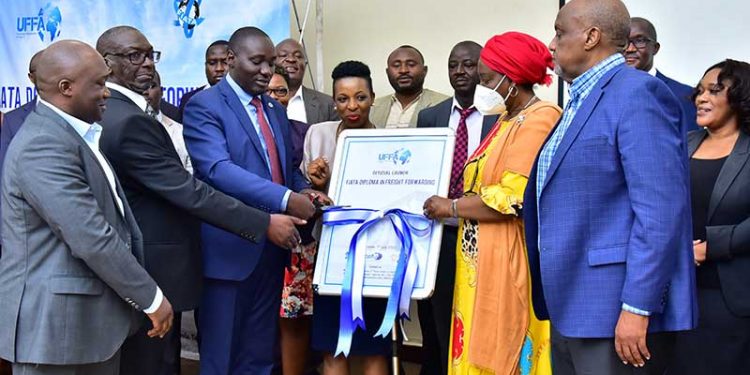The Republic of Uganda recently launched the FIATA diploma in freight forwarding, a training program that targets to equip practitioners with the right skill set and knowledge to competitively operate in the International Freight Forwarding business space.
The milestone is timely as the logistics sector in the EAC region prepares for emerging sectors like the Africa Continental Free Trade Area (AfCFTA) and the Oil and Gas that are keen on standards. By undergoing this training, practitioners in the logistics sector will also be exposed to various training opportunities available, most beneficiaries are expected to be the youth and women in the logistics sector.
Speaking during the launch, Mr. Charles Mwebembezi, the chairman of Uganda Freight Forwarders Association (UFFA) said, “UFFA has a pool of FIATA certified trainers with the right skill set to train and enhance professionalism in the freight forwarding industry to an internationally recognized standard.”
Mr. Mwebembezi recognized the role played by FIATA, the Skills Development Facility Uganda (SDFU), the Private Sector Foundation Uganda (PSFU), and the Federation of East African Freight Forwarders Associations (FEAFFA) and in collaboration with other stakeholders to make the dream a reality.
In his goodwill message, the FEAFFA President Mr. Fred Seka congratulated Uganda on attaining this important milestone in the journey towards professionalizing the freight forwarding industry in the country and the EAC region at large.
In his remarks, the Uganda Revenue Authority (URA) Commissioner of Customs Mr. Abel Kagumire lauded UFFA for its consistency in professionalizing the freight forwarding industry in Uganda through numerous training and capacity-building interventions. He was optimistic that the FIATA diploma will augment the East African Customs and Freight Forwarding Practicing Certificate (EACFFPC) that has since 2007 equipped freight forwarders with the necessary knowledge and skills and enhance the efficiency in service delivery by significantly reducing the accuracy of customs declarations. He pledged to support the FIATA Diploma programme just as they have been supporting the EACFFPC Programme. Mr. Kagumire emphasized the need to support the logistics sector as it significantly contributes to revenue collection.
Speaking during the event, the chairperson of the coordinating team and immediate past chairman of UFFA Mr. Hussein Kiddedde informed the gathering that the FIATA diploma curriculum was very rich to equip practitioners with the right skill set to compete globally.
The FIATA Senior Vice President for Africa Dr. David Koffi Natkur said Uganda was only the fifth country in Africa to start offering the FIATA diploma. He pledged continued support to ensure the programme is successful.
The Chairman of the Uganda Shippers Council and member of the PSFU board Mr. Charles Kareeba encouraged freight forwarders to embrace the program in order to acquire skills that they will leverage for the rest of their professional lives.
Dr. Merian Sebunya of the National Logistics Platform (NLP) appealed to the government to support the customs agents and freight forwarders’ quest to professionally regulate themselves as the best approach to inculcate professionalism in the sector. She called for public-private sector engagement on the proposed bills by the freight forwarders to clarify and iron out any misconceptions that government may have about the proposal.
Dr. Ruth Musoke Buyizika of SDFU encouraged the private sector to take advantage of the programme as proof of the value for the money invested in the FIATA diploma programme.
The launch is a culmination of an over four-year process that started in 2018 with a pre-selection exercise that was followed by rigorous training of trainers in 2019 and subsequently the development of training materials and their validation by FIATA. Uganda becomes the first East African country to offer the Diploma. Other countries offering the diploma are Ghana, Morocco, Egypt, and Ethiopia.
The launch was attended by representatives of the Ministry of Works and Transport, URA, FIATA, UFFA leadership, NLP, UCIFA, FEAFFA, PSFU, members of UFFA, FIATA trainers, and media among others.





